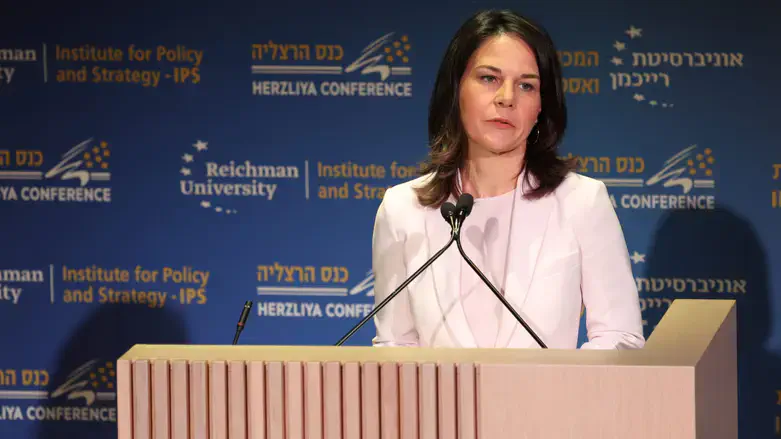
German Foreign Minister Annalena Baerbock spoke at the Herzliya Conference convened by the Institute for Policy and Strategy (IPS) at Reichman University, stressing that, “The security of the state of Israel is paramount for my country.”
In her address, Baerbock emphasized that, “The images from October 7 have stayed with me ever since — as a human, a mother, and as the foreign minister of the country responsible for the worst crime in history – the Shoah. The hope of Israel’s founders was to be the place where Jews would never experience this again, where they would be safe. On October 7 this assurance was shaken to the core.”
“It was important for me to come to Israel directly after October 7 to understand the trauma, to come and see and understand, and to do everything we can to prevent Hamas’s cynical playbook from succeeding. I’ve been to this region 10 times in 9 months.
“The security of the state of Israel is paramount for my country. What does this mean today in this time of anguish? It means to make sure that October 7 must never happen again. It means saying that Israel has the right to defend itself like any country in the world. Hamas started this war and it must end this horror — release all the hostages, and cease its attacks on Israel. Hamas sought to spark a regional escalation with the help of its regional backers. It is particularly important to say these things when speaking with those who seek to cynically move the attention away from the atrocities.”
Regarding Hezbollah, Minister Baerbock said, “No country in the world should have to put up with such attacks. Resolution 1701 must be implemented. I will pay a visit to Beirut tomorrow to discuss our concerns about violence on the northern border.”
Baerbock outlined four elements that she views as crucial for Israel’s lasting security: “Lasting security will only be possible for Israel if there is lasting security for the Palestinians, and vice versa. One cannot happen without the other. I’m aware that support for a two-state solution is not popular in Israel today, but as a friend of Israel, I ask, what is the alternative to securing Israel’s future as a Jewish and democratic state?”
“Hamas has been cynically using civilians as human shields, but Israel still must uphold international humanitarian law. The images from Gaza are travelling the globe and sparking strong emotions, including anger. As a friend of Israel, I want to be frank: This anger doesn’t serve Israel’s security needs, it only serves Hamas. We don’t want Hamas’s strategy to succeed.”
In her second point, Baerbock said, “Israel’s greatest strength and its greatest protection is its humanity and dedication to human rights.” Baerbrock said that the reports and allegations about mistreatment of Palestinians and statements by certain members of the Israeli cabinet about financial punishment of the Palestinian Authority “are disturbing to me because I do not believe they reflect what unites us as democracies.” In her opinion, the PA needs funds in order to reform, so it is counter-productive to withhold these funds: “A reformed PA can be a partner.”
Thirdly, Baerbock said that, “Lasting security is only possible together with partners, because isolation is the enemy of security.”
And lastly, she said, “We need to take a realistic look at the shape of the future of Gaza – people there need to be able to live in dignity. We have been discussing how to end Sinwar and Deif’s reign of terror in Gaza. As an international community, we need to answer how Israel’s security needs can be met.”
“The road to lasting security will be very difficult, but throwing up our hands in resignation is not an option.”

